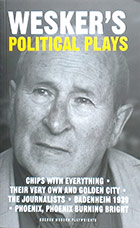Synopsis:
ANDREW COBHAM, an apprentice draughtsman, and his young friends from Durham spend a day sketching in Durham Cathedral. On entering, ANDREW is overwhelmed. The year is 1926.
As though by osmosis ANDREW knows that one day he will become an architect. The youthful, exuberant friends talk about the future that is all before them. They will build six beautiful cities, which will be paid for and owned by the people who live in them. Industry will be capitalised by the Trade Unions.
In the beginning all happens as they plan. We constantly return to the Cathedral to witness their ardent hopes paralleling their future until, at a certain moment, that future swerves in a different direction. Reality in conflict with the Dream.
Two groups of four actors play Andrew and his friends as youths and as characters who grow older and disillusioned. But the play ends in 1926, in the Cathedral, with youth's hopes. The Dream remains. We have only 'flashed forward'.
Excerpt:
"Do you know what depresses me? Men need leaders, that's what depresses me. They'll wait another twenty years and then another leader will come along and they'll build another city. That's all. Patchwork! Bits and pieces of patchwork. Six cities, twelve cities, what difference. Oases in the desert, that the sun dries up… My lifelong boys! My lifelong boys? Prefects! That's all; the Labour movement provides prefects to guard other men's principles for living…They need them, we supply them. I don't suppose there's such a thing as democracy, really, only a democratic way of manipulating power. And equality? None of that either, only a gracious way of accepting inequality."
Reviews:
…territory that few playwrights have ventured into and he renders it with beautiful accuracy…
Ronald Bryden, Observer
